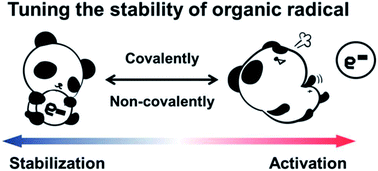当前位置:
X-MOL 学术
›
Chem. Sci.
›
论文详情
Our official English website, www.x-mol.net, welcomes your feedback! (Note: you will need to create a separate account there.)
Tuning the stability of organic radicals: from covalent approaches to non-covalent approaches
Chemical Science ( IF 8.4 ) Pub Date : 2020/01/04 , DOI: 10.1039/c9sc06143f Bohan Tang 1, 2, 3, 4, 5 , Jiantao Zhao 1, 2, 3, 4, 5 , Jiang-Fei Xu 1, 2, 3, 4, 5 , Xi Zhang 1, 2, 3, 4, 5
Chemical Science ( IF 8.4 ) Pub Date : 2020/01/04 , DOI: 10.1039/c9sc06143f Bohan Tang 1, 2, 3, 4, 5 , Jiantao Zhao 1, 2, 3, 4, 5 , Jiang-Fei Xu 1, 2, 3, 4, 5 , Xi Zhang 1, 2, 3, 4, 5
Affiliation

|
Organic radicals are important species with single electrons. Because of their open-shell structure, they are widely used in functional materials, such as spin probes, magnetic materials and optoelectronic materials. Owing to the high reactivity of single electrons, they often serve as a key intermediate in organic synthesis. Therefore, tuning the stability of radicals is crucial for their functions. Herein, we summarize covalent and non-covalent approaches to tune the stability of organic radicals through steric effects and tuning the delocalization of spin density. Covalent approaches can tune the stability of radicals effectively and non-covalent approaches benefit from dynamicity and reversibility. It is anticipated that the further development of covalent and non-covalent approaches, as well as the interplay between them, may push the fields forward by enriching new radical materials and radical mediated reactions.
中文翻译:

调节有机自由基的稳定性:从共价方法到非共价方法
有机自由基是具有单电子的重要物种。由于它们具有开壳结构,因此广泛用于功能材料,例如自旋探针,磁性材料和光电材料。由于单电子的高反应性,它们通常充当有机合成中的关键中间体。因此,调节自由基的稳定性对其功能至关重要。在这里,我们总结了共价和非共价方法,通过空间效应和自旋密度的离域调节来调节有机自由基的稳定性。共价方法可以有效地调节自由基的稳定性,非共价方法则受益于动态性和可逆性。预计共价和非共价方法的进一步发展以及它们之间的相互作用,
更新日期:2020-02-13
中文翻译:

调节有机自由基的稳定性:从共价方法到非共价方法
有机自由基是具有单电子的重要物种。由于它们具有开壳结构,因此广泛用于功能材料,例如自旋探针,磁性材料和光电材料。由于单电子的高反应性,它们通常充当有机合成中的关键中间体。因此,调节自由基的稳定性对其功能至关重要。在这里,我们总结了共价和非共价方法,通过空间效应和自旋密度的离域调节来调节有机自由基的稳定性。共价方法可以有效地调节自由基的稳定性,非共价方法则受益于动态性和可逆性。预计共价和非共价方法的进一步发展以及它们之间的相互作用,



























 京公网安备 11010802027423号
京公网安备 11010802027423号